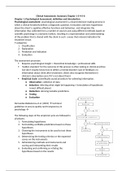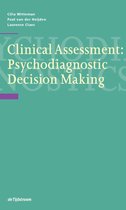Summary
Clinical Assessment Summary Book (chapter 1-3-4-5-6)
- Course
- Institution
- Book
This is a summary of the book "Clinical Assessment: Psychodiagnostic Decision Making" for the course "Clinical Assessment" for the study Psychology. This course is given at the Radboud University in Nijmegen. The book is written by Cilia Witteman, Paul van der Heijnen and Laurance Claes.
[Show more]




